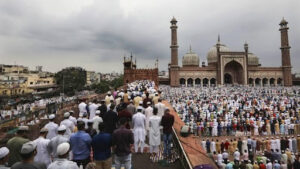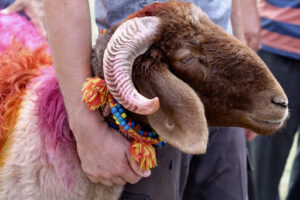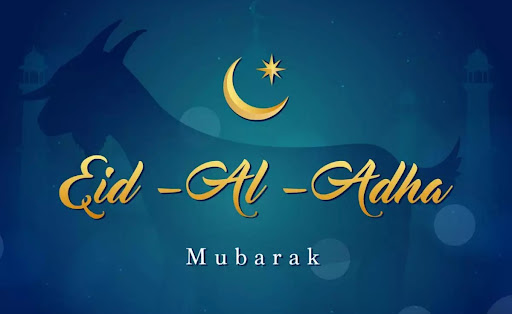Eid al-Adha is an important occasion in the Islamic calendar that holds great significance for Muslims all around the world. It is a time of reflection, spiritual devotion, and celebration for Muslims who come together with their families, friends, and communities to observe this joyous occasion.
In this article, we will dive deeper into the importance and significance of Eid al-Adha and explore its traditions and customs.
Meaning of Eid Al-Adha in English
Eid Al-Adha, also known as the Festival of Sacrifice, is a major Islamic holiday that memorialized Prophet Ibrahim’s willingness to sacrifice his son as an act of submission to Allah S.W.T.
It is celebrated on the 10th day of Dhu al-Hijjah, the 12th month of the Islamic lunar calendar. The holiday involves the sacrifice of a lamb or other animal, with the meat distributed among family, friends, and the poor. The significance of Eid Al-Adha lies in its role as a time for Muslims to come together in prayer, reflection, and celebration of their faith.
Significance of Eid Al-Adha

The significance of Eid al-Adha lies in its historical and religious background, as well as its social and cultural dimensions. Here are some of the key aspects of its significance:
1. Honoring the Prophet Ibrahim’s sacrifice
Eid al-Adha commemorates the willingness of Prophet Ibrahim Sacrifice his son Ismail as an act of submission to Allah’s command.
According to Islamic tradition, as Ibrahim prepared to carry out the sacrifice, Allah replaced Ismail with a ram and spared his life.
So symbolizing Ibrahim’s submission to Allah and his willingness to sacrifice everything for His sake is one of the main significances of Eid Al-Adha.
2. Emphasis on sacrifice and submission to Allah
The significance of Eid al-Adha focuses mainly on the importance of sacrifice and submission to Allah in Islam. Muslims are encouraged to emulate the prophet Ibrahim’s example and offer sacrifices of animals (usually sheep, goats, or cows) as a symbol of their devotion and submission to Allah.
The meat is then distributed among family, friends, and the needy, emphasizing the importance of generosity and sharing.
3. Religious observance
Eid al-Adha is a time for prayer, reflection, and celebration. Muslims gather for Eid prayers on the morning of the festival day and exchange greetings with each other. The day is marked by feasting, sharing food with others, and giving gifts to loved ones.
4. Celebration of Hajj pilgrimage
Eid al-Adha also marks the end of the annual Hajj pilgrimage to Mecca, which is considered one of the Five Pillars of Islam. It is a mandatory religious duty for all adult Muslims who are physically and financially capable of undertaking the journey.
The pilgrimage lasts for several days and involves a series of rituals and activities such as dressing in Ihram clothing, gathering at the plain of Arafat for prayer and reflection, stoning the devil, sacrificing an animal, and completing the Tawaf by circling the Kaaba seven times.
The pilgrimage symbolizes the unity of the Muslim ummah and symbolizes the importance of brotherhood and sisterhood among Muslims from different parts of the world.
5. Strengthening of family and community ties
Eid al-Adha is a time for Muslims to come together and celebrate with family and friends. The significance of Eid Al-Adha emphasizes the importance of strengthening family and community ties and provides an opportunity for Muslims to reconnect with loved ones and show kindness to one another.
6. Celebration of multiculturalism and diversity
Eid al-Adha is celebrated by Muslims around the world and serves as a reminder of the diversity and multiculturalism of the Muslim ummah. The festival provides an opportunity for Muslims from different cultures, languages, and backgrounds to come together as brothers and sisters to celebrate their faith.
Overall the significance of Eid Al-Adha lies in devotion, sacrifice, and submission to Allah, as well as the importance of family and community ties and the celebration of multiculturalism and diversity.
Traditions and practices of Eid Al-Adha

The following are some of the traditions and practices associated with the significance of Eid Al-Adha:
- Offering prayers:
On the morning of Eid Al-Adha, Muslims gather in mosques or designated open spaces to offer special prayers known as Eid prayers. These prayers consist of two rakats with Eid Takbeers, followed by a sermon (khutbah) delivered by the imam
- Animal sacrifice:
One of the central rituals of Eid Al-Adha involves the sacrifice of an animal, typically a sheep, goat, cow, or camel. This is done to commemorate Prophet Ibrahim’s willingness to sacrifice his son Ismail, and it symbolizes the Muslim’s willingness to sacrifice for the sake of Allah. The meat from the sacrificed animal is divided among family, friends, and the needy.
- Greeting each other:
After offering prayers, Muslims exchange greetings and well wishes with each other, saying “Eid Mubarak”, which means “blessed Eid” in Arabic. They also hug and congratulate each other on completing the holy month of Dhul-Hijjah.
- Family gatherings:
Eid Al-Adha is a time for families to come together and celebrate. People prepare special meals and sweets, and children receive gifts and money from their elders.
- Charity:
Giving charity is an important part of Eid Al-Adha. Muslims are encouraged to give to the poor and needy, especially on this occasion.
- Pilgrimage:
For those who are able, Eid Al-Adha marks the end of the Hajj pilgrimage to Mecca in Saudi Arabia. Millions of Muslims from around the world travel to Mecca to perform this once-in-a-lifetime religious obligation.
Eid al-Adha is a time for Muslims to come together to celebrate their faith, renew their commitment to God, and reflect on their spiritual journey.
The festival represents an important Significance of Eid Al-Adha that unites Muslims across the globe, regardless of their cultural or ethnic background. At its core, Eid al-Adha teaches us about sacrifice, humility, and submission to God, and encourages us to show compassion and gratitude to all.









